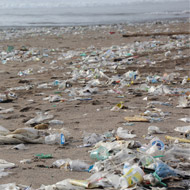Nearly 40 countries have joined the UN Environment's CleanSeas campaign.
Chile, Oman, Sri Lanka and South Africa join UN Environment initiative
Some 40 countries have committed to a United Nations-led campaign against marine litter and ocean pollution.
On Monday (4 December), it was announced that Chile, Oman, Sri Lanka and South Africa will be joining the UN Environment's CleanSeas initiative, which includes measures such as plastic bag bans, new marine reserves and drives to increase recycling.
The four countries announced their support during the UN Environment Assembly in Nairobi, Kenya (4 - 6 December).
“For too long, we have treated the ocean as a bottomless dumping ground for plastic, sewage and other waste,” said Erik Solheim, head of UN Environment. “The countries supporting CleanSeas are showing the leadership we need in order to end this abuse, and protect the marine resources on which millions depend for their livelihoods.”
Minister of environment for Sri Lanka, Anura Dissanayake, added, "Sri Lanka is taking bold action to turn the tide on plastics. We have banned plastic bags and are now working to reduce the number of plastic bottles in the country. We want to be a green and blue beacon of hope in Asia and do everything we can to keep the seas clean.”
Nearly 40 countries from Kenya to Canada and Indonesia to Brazil have joined the UN’s CleanSeas campaign, accounting for more than 50 per cent of the world’s coastline. The commitments made by the newest CleanSeas members are:
• Sri Lanka will implement a ban on single-use plastic products from 1 January 2018, step up the separation and recycling of waste, and set the goal of making its ocean and coasts “pollution-free” by 2030.
• Chile is legislating to extend producer responsibility and encourage recycling and establishing more marine protected areas.
• Chilean cities are banning plastic bags in advance of a planned national ban.
• South Africa will step up its beach cleanup program and prioritise action on tyres, electronic waste, lighting and paper and packaging. This includes extended producer responsibility for plastic packaging.







 The Greyhound Board of Great Britain has published new vaccination guidance, with all greyhounds registered from 1 January, 2027 required to have the L4 leptospirosis vaccination, rather than L2.
The Greyhound Board of Great Britain has published new vaccination guidance, with all greyhounds registered from 1 January, 2027 required to have the L4 leptospirosis vaccination, rather than L2.
